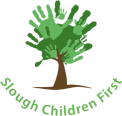Slough Centre Nursery - sessional care

The nursery school has places for 163 children attending three hour sessions per day. Children spend the majority of their nursery session playing and actively learning through a variety of self-chosen activities.
Toys and equipment are set up in a range of defined areas that are accessible for the children. The areas offer special interest items and experiences.
We also offer:
- 30 hours 9.30-3.30pm, Monday to Friday
- breakfast club
- tea club, full time
- funded 2 year olds and paying 2 year old places.
Please contact the nursery office on 01753 521975 for more information.
Who to contact
- Contact name
- Aisha Lateef
- Contact position
- Interim Head Teacher
- Telephone
- 01753 521975 01753 521975
- head@slough-nursery.slough.sch.uk
- Website
- Slough Centre Nursery
- Scan to visit this website
Where to go
- Address
-
Slough Centre Nursery School
Buckingham Avenue East
Slough
Berkshire - Postcode
-
SL1 3EA
Find SL1 3EA on a map
Costs
- Details
- 30 hours - 9.30am to 3.30pm. This can be extended by 1 hour per day at a charge of £4 per day.
- Full time - 8.30am to 3.30pm, Monday to Friday - £139.75 per week.
Inclusion information
- Wheelchair access
- Yes
- Details
- Disabled toilet, wheelchair ramp
- Special Needs provision
- Yes
- Special Needs experience
-
Makaton
Learning difficulties
Language impairment
Hearing Difficulties
Serious allergy
Renal failure
Physical impairment
Motor impairment
Speech Impediment
Social development impairment
Sign language
Severe dietary needs
Visual impairment
Trained to use an EPI Pen
Aspergies
Allergies
ADHD
Challenging Behaviour
Cerebral palsy
Autism spectrum
Asthma
Downs syndrome
Diabetes
Delayed Development
Cystic Fibrosis
Emotional needs
Edwards syndrome
Eczema
Dyslexia/Dyspraxia - Provision for special dietary needs
- Yes
- Special cultural provisions
- Yes
Childcare information
Vacancies
- Has immediate vacancies for funded early learning?
- Yes
- Details
- Please contact nursery
- Updated
- 04/01/2024
Funded places
- 3/4 year old funding
- Yes
- 2 year old funding
- Yes
School pickups
Does not offer school pickups
Local Offer
- Description
Our school is located in central Slough and is a purpose built, open plan learning space.
The school has places for 163 children in total, for 2, 3 and 4 yr olds. These places consist of a combination of morning, afternoon and 30hr places.
Each child is attached to a ‘homebase’ group with a team of supportive staff.
Our staff include:
- teachers
- early years practitioners
- teaching assistants.
In the mainstream nursery we support children with a range of additional needs. To enhance our provision, the school has a 6 place resource unit for children with autistic spectrum disorders attached to the mainstream nursery.
We are committed to working together as a staff and in partnership with parents, carers and other agencies to support the well-being of all the children.
Your child’s welfare is our top priority and we will endeavour to ensure you child feels safe and secure while they are a pupil at our nursery school.
- Contact name
- Mrs Lateef
- Contact telephone
- 01753 521975
- Contact email
- admin@slough-nursery.slough.sch.uk
- Local Offer age bands
- Early Years (0-4 years)
Schools extended Local Offer response
- Special Educational Needs policy
Our school is located in Central Slough and is a purpose built, open plan learning space.
The school caters for up to 163 children in total. We have children accessing our:
- 2yr old
- 3 & 4 year old
- ASD resource provision.
The majority of our children attend part time (15hrs a week) with some children accessing full time or 30hrs places.
In the mainstream nursery we support children with a range of additional needs. To enhance our provision, the school has a 6 places resource unit for children with autistic spectrum disorders attached to the mainstream nursery.
‘Sharing, Caring & Learning Together’ is what we believe for all of our school community.
We are proud of our nursery school, with its warm welcoming atmosphere. It gives children and their families a sense of belonging and a feeling of security.
Children are allowed to grow at their own pace in an environment where they can experience:
- spontaneity
- joy
- wonder
- enthusiasm
- curiosity
- challenge
- success and failure
- persistence and friendship.
The school has the expertise to meet specific needs and to support all children in a responsive manner to suit their individual requirements.
Our staff work together to maximize learning opportunities for every child. They use our resources flexibly to be most effective.
We aim to:
- provide a broad, balanced and relevant curriculum to all the children, regardless of their ability or additional needs, within the Early Years Foundation Stage
- identify needs as early as possible and work closely with parents to ensure appropriate assessment and support arrangements are in place and the child’s needs are properly addressed
- foster a climate that supports flexible and creative responses to individual needs and train our staff to support inclusive practice.
- Teaching and learning
At our nursery we closely follow the guiding principles of the Early Years Foundation Stage.
We:
- believe that each child is unique and is a capable learner
- understand that children will learn in difference ways and develop at different times.
A key component in providing successful support is:
- working in partnership
- fostering positive relationships with children and parents so knowledge is acquired and shared appropriately.
Staff are adaptable and responsive to the individual needs of a child and use their knowledge and experience to assist them in delivering the best support possible.
They work hard to ensure the environment is enabling for every child, appropriately resourced with engaging and challenging activities to suit:
- different learning styles
- ability levels
- interests.
We operate a key worker system for monitoring development of individual children and working with their parents.
Information is gathered, shared and used in a variety of ways to support children and may include:
- meeting parents and children on a home visit
- baseline assessments during a child’s first half term show what they know, understand and can do
- making observations about children’s characteristics of learning, development and interests from interactions in nursery
- regular discussions with parents
- sharing the child’s online learning journal with them and their parents on a regular basis
- using assessment information to monitor progress, attainment and identify next steps in learning for groups of children and individuals
- planning tailored to groups and individuals based on the needs and interests of the children, which is carefully evaluated.
- Identifying and assessing Special Educational Needs
We are committed to the early identification of special educational needs. We adopt a graduated approach, in line with the SEN Code of Practice.
Concerns about a child’s needs, progress or attainment may be raised in different ways.
- Key workers meet with parents on a regular basis and develop a close relationship. Often concerns are raised and explored during these discussions together.
- Concerns may be raised by other agencies supporting a child or by staff working in the school.
- Staff use assessment data to identify children who are at risk of under achieving and any specific aspects of learning that are causing concern.
Once a concern is raised it is shared so the:
- parents
- staff working with the child
- Special Educational Needs Coordinator (SENCo)
are all aware and can work in partnership to plan how to most effectively support the child, monitor and review their progress. This may include:
- discussions
- consultations
- and meetings with the key worker, class teacher and SENCo.
Following this, the concerns and subsequent plans to address them are disseminated with all concerned:
- verbally and
- with a written record such as parent consultation, personalised support plan or IEP.
- Involving parents and children/young people in planning and reviewing progress
The SENCo will:
- maintain an overview of progress
- work with practitioners to check provision is relevant and appropriate
- organize and assist with regular reviews.
When progress is re-evaluated and a concern still remains then a joint decision may be made to utilize other support available within the school or to seek advice and/or support from other agencies within the local authority such as:
- educational psychologist
- speech and language therapist
- specialist teacher of the visually or hearing impaired
- autism outreach service
- physiotherapist or occupational therapist.
The needs, targets, support strategies and provision are always carefully planned and tailored to each child (through the use of Individual Education Plans or IEPs).
We recognize that parents and children themselves hold key information and have a critical role to play in making plans, deciding targets and reviewing progress. The key worker will always liaise closely with parents to ensure we are working in partnership.
We also aim to give children the opportunity to:
- follow their interests
- make their own choices
- express their views as far as they are able.
Children are assisted with and encouraged to express their views by adding comments or pictures to their online learning journals.
Staff supplement this by observing and interacting with the children, identifying their current motivators and triggers and using information to inform planning.
The planning and reviewing process may include the following.
- Discussions and consultations with parents concerning progress and next steps.
- Key workers seeking child’s views as their contribution.
- Assessment data monitored by class teacher and SENCo to help ensure appropriate planning and provision.
- An open door policy allowing parents to discuss issues as and when the need arises in order to support the child fully.
- Regular reviews of plans and targets made (usually termly).
- Meeting with the SENCo to jointly agree targets, strategies and future provision.
- Children with a statement/Education & Health Care Plan (EHCP) will have a formal review (6 monthly) in addition to the above. Parents contribute and take part in the review and receive copies of all relevant paperwork.
- SENCo sharing knowledge and signposting parents to other information and support services as appropriate.
- Additional support
The categories of SEN set out in the Draft SEN Code of Practice (2014) are:
- communication and interaction
- cognition and learning
- social, mental and emotional health
- sensory and/or physical.
Our SENCo, who is also an experienced teacher:
- plans and delivers specifically tailored small group and individual work supported by other staff in the school
- monitors and provides guidance to staff working with pupils within the classroom to ensure provision is well tuned and suited to the individual needs of the children.
Support offered to children will vary and be dependent on the needs of the current cohort and individuals within the nursery and may include, the following, as appropriate.
- Teachers have high expectations for all children.
- Teaching is based on building on what children already know, can do and can understand.
- Planning by staff experienced and skilled at adapting and modifying activities and provision to suit the needs of different children ensuring progress and success for all.
- Learning opportunities delivered by staff who are sensitive and responsive to the changing needs and interests of children and to a range of learning styles.
- Access to and guidance on introducing a wide range of supportive strategies (e.g. visual timetables, PECS, ABC behavior chart, total communication, ‘I talk’) in the classroom.
- Learning support staff effectively deployed to support children’s learning.
- Additional adult support during continuous provision and during group times.
- Individual targets that are specific, measurable and achievable.
- Adapted resources.
- Specific small group support work (e.g. speech and language programme delivery, PALS (Playing and Learning to Socialise).
- Specific one-to-one support work (e.g. See and Learn programme).
- Use of a wide range of sensory equipment and sensory room.
- Use of ICT (e.g. interactive whiteboard).
In addition to the support and provision made in the mainstream nursery, the nursery is resourced to take up to 6 children in the Resource Unit (RU).
All of these children have a diagnosis of autism & may have complex needs which might include language, social interaction, physical, sensory or medical needs.
Children from the RU receive a high level of small group & individual support in their own classroom base. They also join:
- their mainstream peers in free-flow play every day, with adult support
- adult-led learning groups with the mainstream children, as appropriate.
- Extra activities
We encourage visits into the nursery which included a mobile farm.
All activities are planned around the children’s individual needs and abilities and will vary accordingly.
Risk assessments are carried out beforehand to ensure:
- it is accessible for all to access
- additional supportive measures are put in place
prior to and during a visit as and when needed.
- Meeting social and emotional needs of children/young people
Personal, social and emotional development is a prime area in the Early Years Foundation Stage.
We fully recognise its importance as a fundamental building block to:
- engagement
- and well-being
at nursery and to future learning success.
All children in the nursery are encouraged to respect others. There is a particular emphasis on sharing and turn-taking activities throughout the nursery and particularly in the resource unit.
Meeting these needs may include the following.
- Key worker develop close, secure relationships with children and parents.
- Class teacher who monitors progress, attainment and next steps in learning. Then plans tailored provision to meet those needs and carefully evaluates its impact.
- Staff with experience and particular understanding of social, emotional and behavioral difficulties.
- Whole school circle time programme.
- Additional targeted small group.
- Access to local outside agencies (e.g. behavior support service, educational psychology service).
- Special transition planning arrangements for vulnerable children.
- Positive Handling techniques (We use positive behavior strategies throughout the nursery and have individual positive handling plans in place for SEN children in the resource unit who have very challenging behavior).
- Keeping up to date with knowledge and skills
Staff have a wide range of experience and have undertaken training in many different areas. This monitored by the SENCo and Headteacher who organise staff to:
- utilize expertise
- support other colleagues
to best meet the needs of the children in the school.
Areas of particular knowledge or experience are:
- SENCo who is an experienced teacher and holds the national qualification for SENCo’s.
- autistic spectrum disorders (including visual aids and PECs)
- sensory and physical difficulties (including visual and hearing impairment)
- medical conditions
- learning difficulties (including ‘see and learn’ programme)
- speech, language and communication difficulties
- social, emotional and behavioral difficulties
- total communication approaches (example Makaton)
- Team Teach strategies.
Check Slough Centre Nursery website for details or contact us.
- Transitions
We recognize the importance of making a smooth transition:
- to nursery
- from nursery to primary school.
We actively work with children, parents and other schools to do this.
We ensure:
- concerns are listened to and addressed
- appropriate support is given
- information is shared so that supportive strategies can be continued
- appropriate provision and planning made when the child begins at their new school.
This may include:
- discussions with parents
- discussions with children
- using key worker and parental observations of the child
- supportive strategies and tangible aids for the child (example: photo book)
- sharing information with the receiving school
- transition planning meeting with all involved
- seeking advice from other supportive agencies
- school staff visiting the child in the nursery
- additional visits to the receiving school
- supportive advice for parents.
- Helpful contacts
- Headteacher - Mrs Aisha Lateef
- SENCo
Address: Slough Centre Nursery, Buckingham Avenue East, Slough SL1 3EA.
Call 01753 521975 or e-mail admin@slough-nursery.slough.sch.uk.
Last updated
Last updated - .
Disclaimer
This information has been collected from third party providers. Slough Information and Services Guide and Slough Borough Council cannot accept responsibility for the accuracy of this information and recommend that parents, carers, young people, residents and professionals check with providers regarding DBS (Disclosure & Barring Service), OFSTED and CQC registrations.





